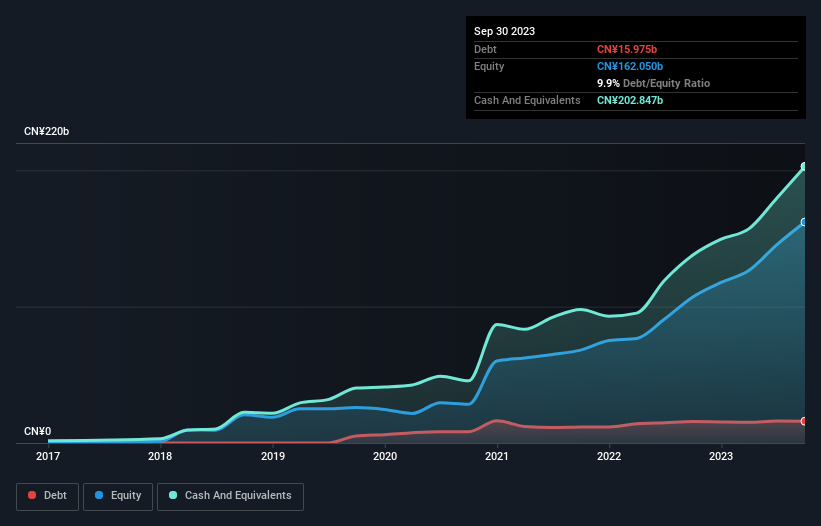PDD Holdings (NASDAQ:PDD) Seems To Use Debt Rather Sparingly
The external fund manager backed by Berkshire Hathaway's Charlie Munger, Li Lu, makes no bones about it when he says 'The biggest investment risk is not the volatility of prices, but whether you will suffer a permanent loss of capital.' So it might be obvious that you need to consider debt, when you think about how risky any given stock is, because too much debt can sink a company. We can see that PDD Holdings Inc. (NASDAQ:PDD) does use debt in its business. But should shareholders be worried about its use of debt?
When Is Debt Dangerous?
Debt is a tool to help businesses grow, but if a business is incapable of paying off its lenders, then it exists at their mercy. Part and parcel of capitalism is the process of 'creative destruction' where failed businesses are mercilessly liquidated by their bankers. While that is not too common, we often do see indebted companies permanently diluting shareholders because lenders force them to raise capital at a distressed price. Of course, debt can be an important tool in businesses, particularly capital heavy businesses. When we think about a company's use of debt, we first look at cash and debt together.
Check out our latest analysis for PDD Holdings
How Much Debt Does PDD Holdings Carry?
The chart below, which you can click on for greater detail, shows that PDD Holdings had CN¥16.0b in debt in September 2023; about the same as the year before. But it also has CN¥202.8b in cash to offset that, meaning it has CN¥186.9b net cash.
How Healthy Is PDD Holdings' Balance Sheet?
Zooming in on the latest balance sheet data, we can see that PDD Holdings had liabilities of CN¥148.1b due within 12 months and liabilities of CN¥4.08b due beyond that. On the other hand, it had cash of CN¥202.8b and CN¥8.69b worth of receivables due within a year. So it actually has CN¥59.3b more liquid assets than total liabilities.
This short term liquidity is a sign that PDD Holdings could probably pay off its debt with ease, as its balance sheet is far from stretched. Simply put, the fact that PDD Holdings has more cash than debt is arguably a good indication that it can manage its debt safely.
On top of that, PDD Holdings grew its EBIT by 61% over the last twelve months, and that growth will make it easier to handle its debt. When analysing debt levels, the balance sheet is the obvious place to start. But it is future earnings, more than anything, that will determine PDD Holdings's ability to maintain a healthy balance sheet going forward. So if you're focused on the future you can check out this free report showing analyst profit forecasts.
But our final consideration is also important, because a company cannot pay debt with paper profits; it needs cold hard cash. While PDD Holdings has net cash on its balance sheet, it's still worth taking a look at its ability to convert earnings before interest and tax (EBIT) to free cash flow, to help us understand how quickly it is building (or eroding) that cash balance. Over the last two years, PDD Holdings actually produced more free cash flow than EBIT. That sort of strong cash conversion gets us as excited as the crowd when the beat drops at a Daft Punk concert.
Summing Up
While we empathize with investors who find debt concerning, you should keep in mind that PDD Holdings has net cash of CN¥186.9b, as well as more liquid assets than liabilities. The cherry on top was that in converted 161% of that EBIT to free cash flow, bringing in CN¥83b. So is PDD Holdings's debt a risk? It doesn't seem so to us. There's no doubt that we learn most about debt from the balance sheet. However, not all investment risk resides within the balance sheet - far from it. For example, we've discovered 1 warning sign for PDD Holdings that you should be aware of before investing here.
If, after all that, you're more interested in a fast growing company with a rock-solid balance sheet, then check out our list of net cash growth stocks without delay.
Have feedback on this article? Concerned about the content? Get in touch with us directly. Alternatively, email editorial-team (at) simplywallst.com.
This article by Simply Wall St is general in nature. We provide commentary based on historical data and analyst forecasts only using an unbiased methodology and our articles are not intended to be financial advice. It does not constitute a recommendation to buy or sell any stock, and does not take account of your objectives, or your financial situation. We aim to bring you long-term focused analysis driven by fundamental data. Note that our analysis may not factor in the latest price-sensitive company announcements or qualitative material. Simply Wall St has no position in any stocks mentioned.

